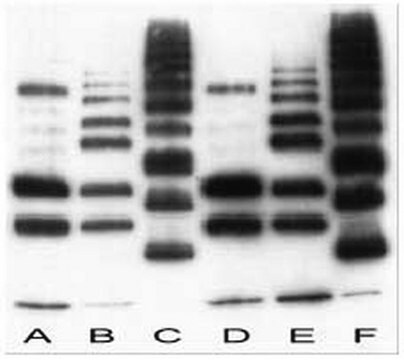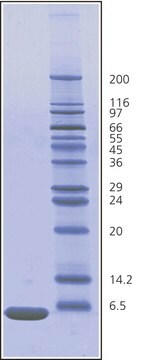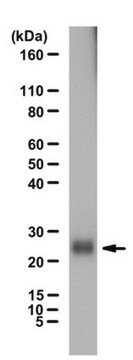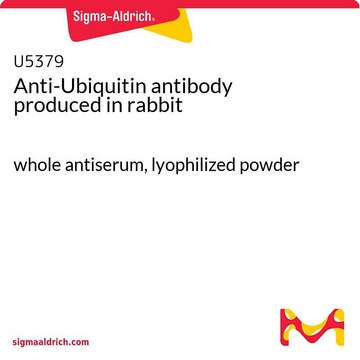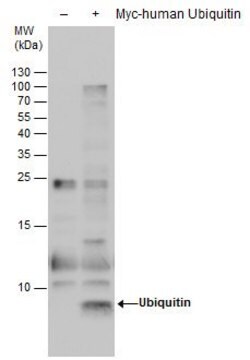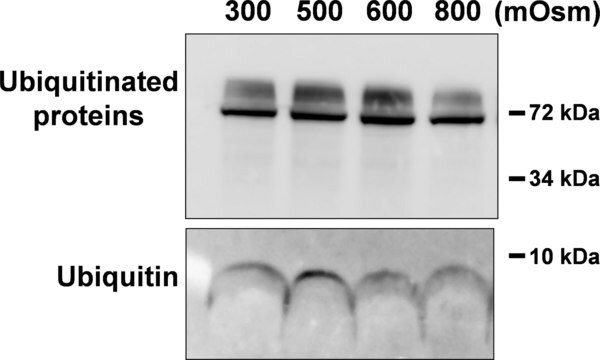추천 제품
생물학적 소스
mouse
Quality Level
항체 형태
purified immunoglobulin
항체 생산 유형
primary antibodies
클론
FK1, monoclonal
종 반응성(상동성에 의해 예측)
all
제조업체/상표
Upstate®
기술
immunohistochemistry: suitable
western blot: suitable
동형
IgM
배송 상태
wet ice
타겟 번역 후 변형
unmodified
일반 설명
Ubiquitin is a polypeptide of 76 amino acid residues, being a very highly conserved and widely distributed protein in all eukaryotic cells. It has been proposed that ubiquitin plays important roles in various biological processes such as the regulation of cell cycle, DNA replication, DNA repair, stress response, apoptosis, signal transduction, and the biogenesis of ribosome, nucleosome, peroxisome and myofibrils. In these processes, ubiquitin functions as both a signal for protein degradation and as a chaperone promoting the formation of organelles.
특이성
Recognizes only poly-ubiquitinylated proteins and not mono-ubiquitinylated proteins or free ubiquitin.
면역원
Poly-ubiquitinylated-lysozyme.
애플리케이션
Anti-Ubiquitinylated proteins Antibody, clone FK1 is an antibody against Ubiquitinylated proteins for use in WB, IH.
Research Category
Protein Trafficking
Protein Trafficking
Research Sub Category
Ubiquitin & Ubiquitin Metabolism
Ubiquitin & Ubiquitin Metabolism
물리적 형태
100 µL of concentration 1mg/mL purified immunoglobulin in PBS containing 0.1% sodium azide. Dilute to working strength with phosphate buffered saline pH 7.2-7.4.
Format: Purified
저장 및 안정성
Stable for 1 year at 2-8°C from date of shipment for up to 12 months.
기타 정보
Concentration: Please refer to the Certificate of Analysis for the lot-specific concentration.
법적 정보
UPSTATE is a registered trademark of Merck KGaA, Darmstadt, Germany
면책조항
Unless otherwise stated in our catalog or other company documentation accompanying the product(s), our products are intended for research use only and are not to be used for any other purpose, which includes but is not limited to, unauthorized commercial uses, in vitro diagnostic uses, ex vivo or in vivo therapeutic uses or any type of consumption or application to humans or animals.
적합한 제품을 찾을 수 없으신가요?
당사의 제품 선택기 도구.을(를) 시도해 보세요.
Storage Class Code
10 - Combustible liquids
WGK
WGK 2
Flash Point (°F)
Not applicable
Flash Point (°C)
Not applicable
시험 성적서(COA)
제품의 로트/배치 번호를 입력하여 시험 성적서(COA)을 검색하십시오. 로트 및 배치 번호는 제품 라벨에 있는 ‘로트’ 또는 ‘배치’라는 용어 뒤에서 찾을 수 있습니다.
Chris McKinnon et al.
Acta neuropathologica, 131(3), 411-425 (2015-12-10)
Prion diseases are a group of fatal neurodegenerative disorders characterised by the accumulation of misfolded prion protein (PrP(Sc)) in the brain. The critical relationship between aberrant protein misfolding and neurotoxicity currently remains unclear. The accumulation of aggregation-prone proteins has been
Kaisa Haglund et al.
Nature cell biology, 5(5), 461-466 (2003-04-30)
Many cellular proteins are post-translationally modified by the addition of a single ubiquitin or a polyubiquitin chain. Among these are receptor tyrosine kinases (RTKs), which undergo ligand-dependent ubiquitination. The ubiquitination of RTKs has become recognized as an important signal for
Hugues Lelouard et al.
Nature, 417(6885), 177-182 (2002-05-10)
Dendritic cells (DCs) are antigen-presenting cells with the unique capacity to initiate primary immune responses. Dendritic cells have a remarkable pattern of differentiation (maturation) that exhibits highly specific mechanisms to control antigen presentation restricted by major histocompatibility complex (MHC). MHC
z-Leucinyl-leucinyl-norleucinal induces apoptosis of human glioblastoma tumor-initiating cells by proteasome inhibition and mitotic arrest response.
Monticone M, Biollo E, Fabiano A, Fabbi M, Daga A, Romeo F, Maffei M, Melotti A et al.
Molecular Cancer Research null
Miao Li et al.
Methods in molecular biology (Clifton, N.J.), 1436, 85-94 (2016-06-02)
Histone deacetylase 6 (HDAC6) is a member of class IIb HDAC family. HDAC6 exists predominantly in the cytoplasm and deacetylates mainly non-histone proteins in the cytoplasm. Via its deacetylase and ubiquitin binding domains, HDAC6 regulates microtubules, cytoskeleton, intracellular trafficking, and
자사의 과학자팀은 생명 과학, 재료 과학, 화학 합성, 크로마토그래피, 분석 및 기타 많은 영역을 포함한 모든 과학 분야에 경험이 있습니다..
고객지원팀으로 연락바랍니다.
